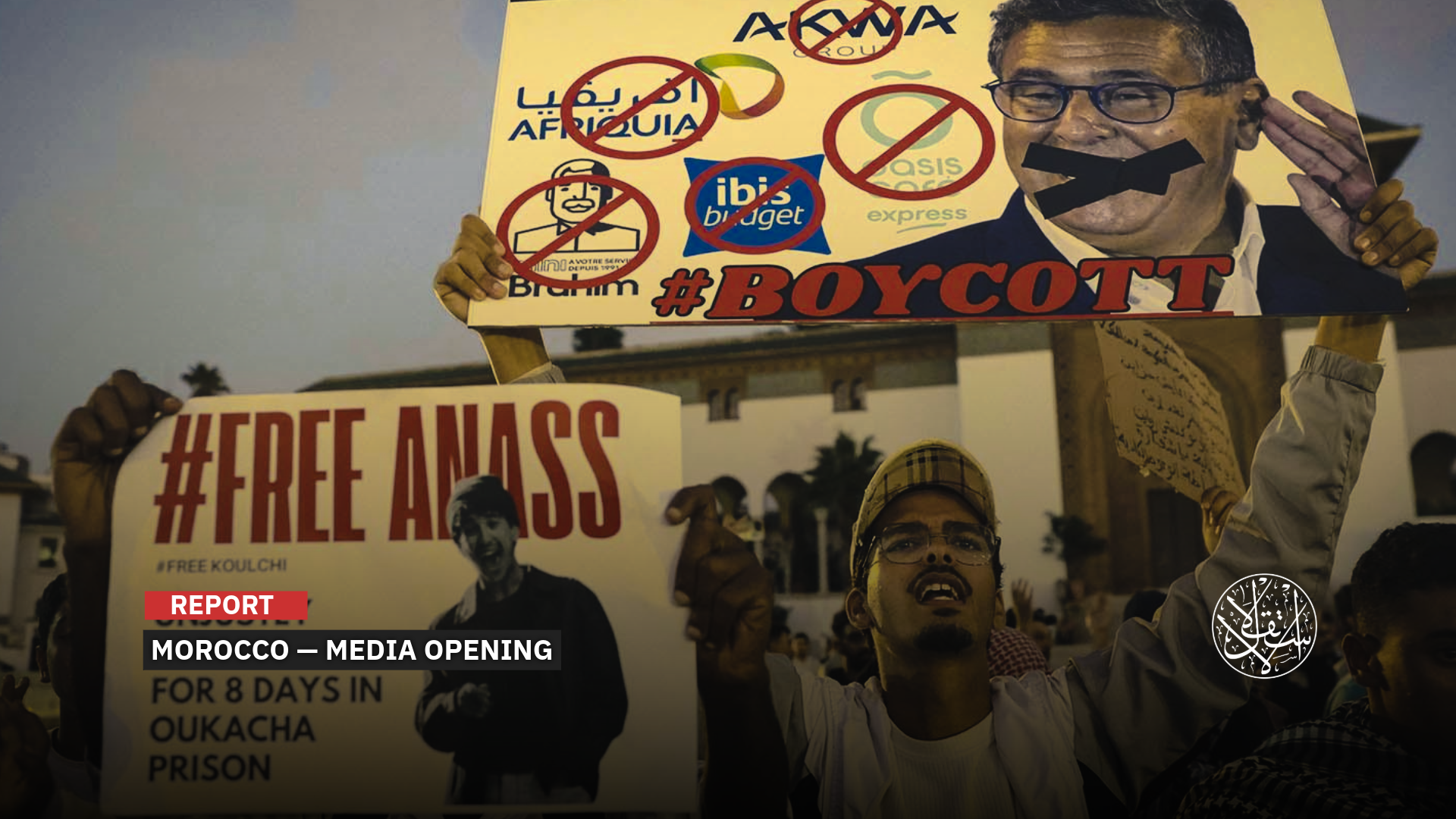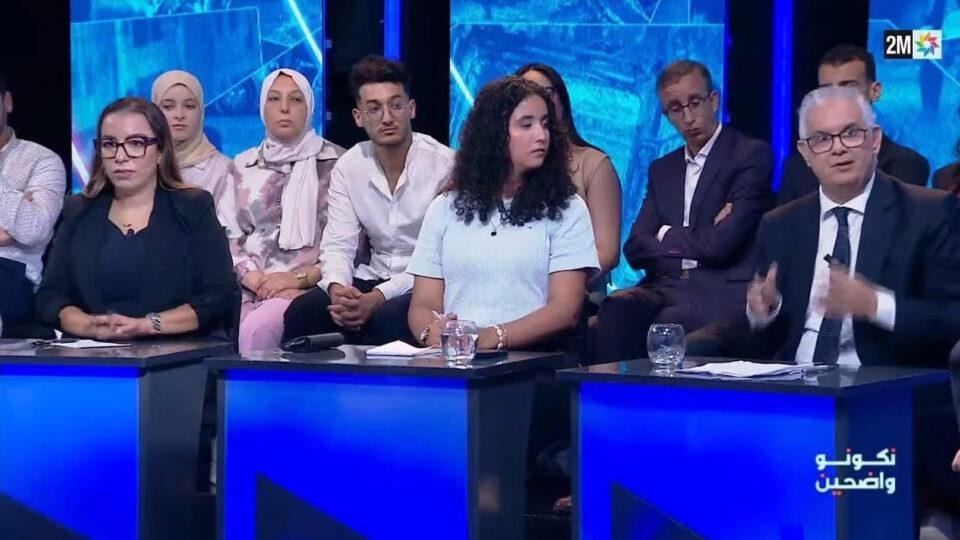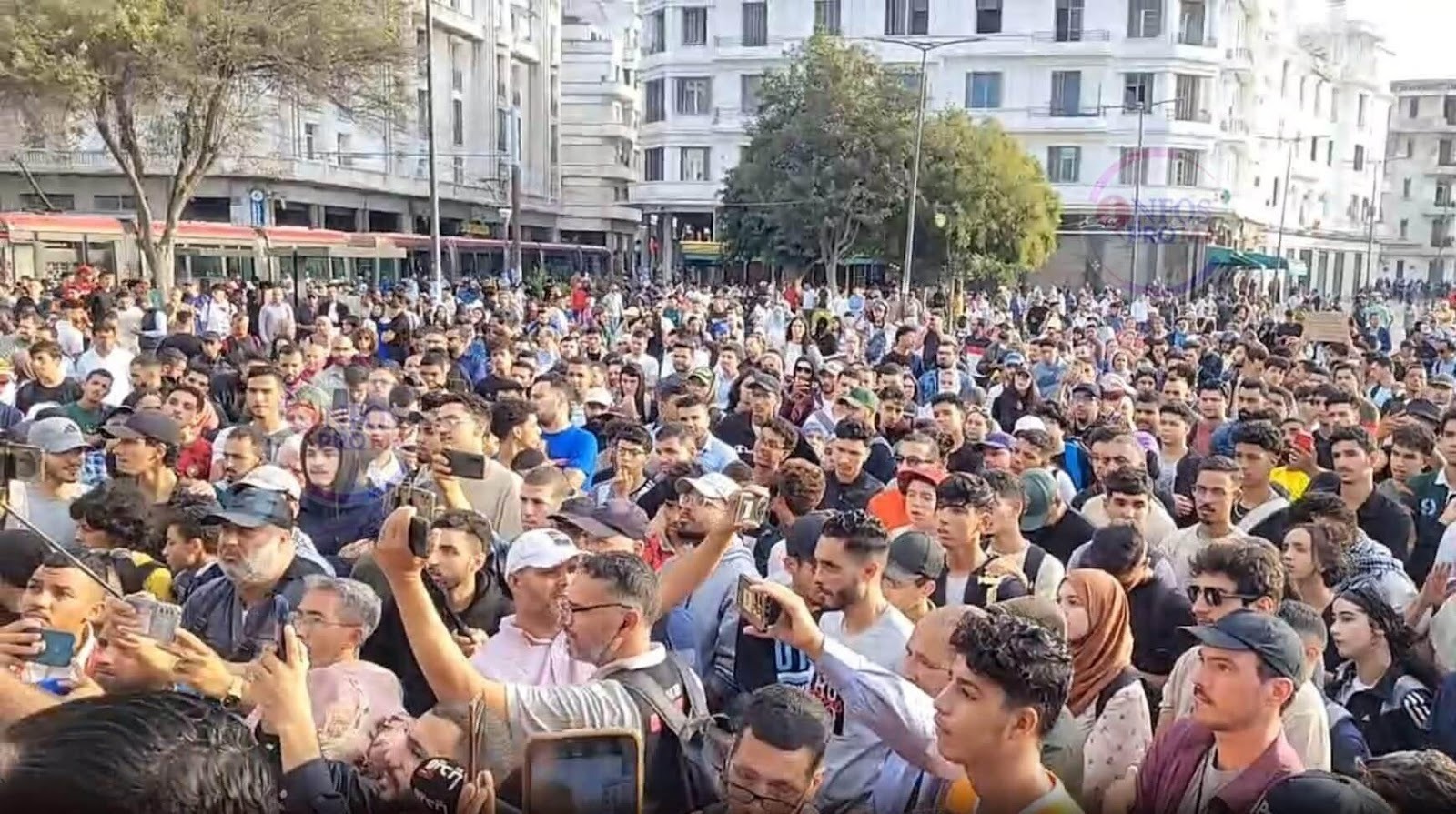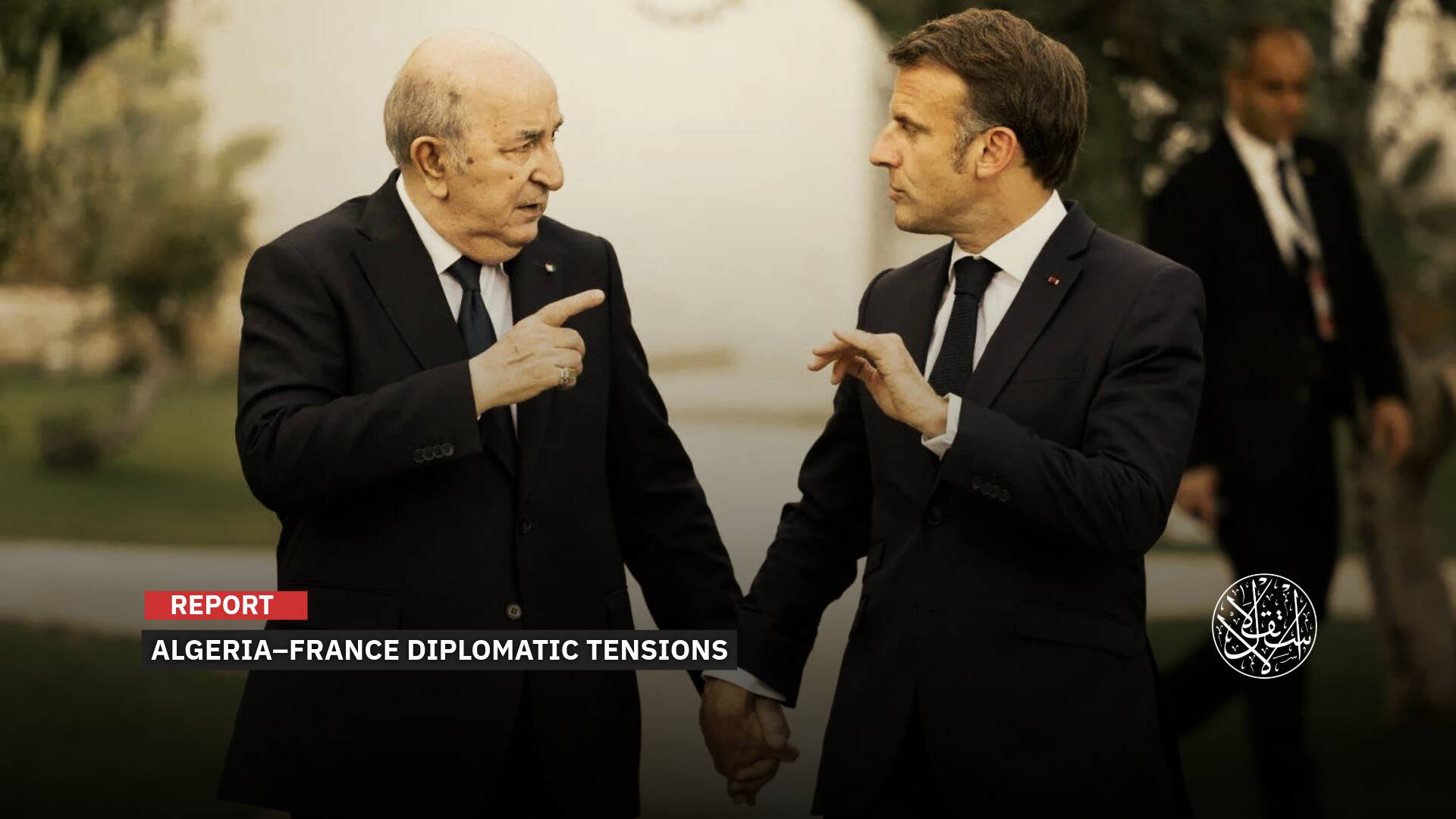State Media in Morocco Engages Youth and Dissenting Voices: A Strategy to Quell Unrest?

The government has become like an abandoned child, unwanted and neglected.
In a break from its usual approach of promoting government narratives and sidelining dissenting voices, Morocco’s state-affiliated television networks have opened their studios to young protesters and opposition figures, raising questions about the shifting dynamics of the country’s political and media landscape.
Since September 27, 2025, mass demonstrations have erupted across Moroccan cities, driven largely by young people demanding urgent reforms in education and healthcare, a serious fight against corruption, and guarantees for a dignified standard of living.
In response, major television channels, including al Aoula (Channel One), 2M, and Medi1, have begun airing interactive talk shows that feature not only journalists and politicians, but also representatives from this new generation of street activists.
In a moment that stunned viewers, Medi1 anchor Nawfal Alawamleh directly challenged government spokesperson Mustapha Baitas, asking whether Prime Minister Aziz Akhannouch’s government would consider resigning in response to the youth’s demands and the mounting pressure from the streets.
Nizar Baraka, Secretary-General of the Istiqlal Party and Minister of Equipment and Water, appeared on the program Nkounou Wadhihin on October 5, 2025, alongside MP Najwa Koukouss of the Authenticity and Modernity Party, Reda Bougemazi, Deputy Secretary of the Justice and Development Party’s youth wing, and a group of young people and students. The program featured sharp criticism of the government.
Medi1 channel aired a special edition of the program Sada al Ahdath, dedicated to an open, no-limits dialogue between the government and the youth, featuring young participants, journalists, and Anis Birou, former minister and senior figure in the National Rally of Independents, the party of the Prime Minister.
The public broadcaster al Aoula aired a special program focused on young people and their demands, featuring a parliamentarian from the ruling majority, a university professor, and a youth representative.
A qualitative Shift
This shift has sparked wide reactions among observers and stakeholders. In this context, journalist Hassan Ait Bihi of the weekly al Ayam described what is unfolding in public media as a qualitative shift in how the Gen Z protest movement is being addressed.
In a Facebook post on October 3, Bihi wrote that, though late, this engagement is better than no engagement at all. He questioned whether what is happening might be "a prelude to seismic, decisive decisions," adding, “The coming days will clarify the reasons behind this shift.”
Blogger and writer Najib Addadi noted that the youth representatives featured in these programs voiced bold positions, speaking openly about the dominance of financial lobbies over government decision-making, the absence of justice in wealth distribution, and their view that the current government operates in the interest of private gain rather than the public good.
In a Facebook post on October 6, Addadi observed that the debate on the program Nkounou Wadhihin unfolded with an unprecedented level of freedom, allowing for direct and critical messages to be delivered to the government within a responsible institutional framework.
He stressed that “this program confirms that Morocco is entering a new phase of clarity in public discourse, marked by a conscious generation calling for reform within the framework of patriotism and respect, and by public media working to restore trust and build bridges between youth and institutions.”
In a different tone, Samir Chaouki, head of the Omega Center for Economic and Geopolitical Research, criticized Nizar Baraka in a Facebook post on October 5 for distancing himself from government responsibility and claiming, during a 2M program appearance, that he was speaking in a partisan capacity.
Chaouki stressed that Baraka’s stance was inappropriate, arguing that as a sitting member of the government, he should have the courage to face public debate wearing his ministerial hat, one that grants him a salary, substantial benefits, influence, and privilege.
“A true leader is the one who stays on board the ship when it sinks, not the first to jump off,” Chaouki said.
In a similar vein, Hassan el Mouloua, editor-in-chief of Al Anbaa Post, wrote in a Facebook post on October 5 that the government has come to resemble an abandoned child, “an unwanted girl born to a single mother, with no father claiming her and no mother embracing her.”
“Everyone is disowning it, one after the other, as if it were a heavy burden each party is trying to cast off,” Mouloua said.
Human rights activist and university professor Khalid el Bekkari said that “the emergence of such positions on a public television channel sent a clear message to citizens, that the government is not accountable.”
Speaking to Sawt Al Maghrib or The Voice on October 6, El Bekkari added that the public has come to realize that the government is unable to defend its own record, and that it is merely symbolic, incapable of facing public opinion.
He went further, stating that the message also implied some government members are using their positions to protect personal interests and offer privileges to close associates, arguing that “this situation is the greatest insult to the institutions.”
From another angle, political activist Mostapha Bougarn described the state’s current strategy as “highly intelligent.” On a 2M program, for instance, he said the state appears to be deliberately unsettling the binary of “Gen Z versus the government.”
In a Facebook post on October 6, Boukren wrote that the state is trying to manufacture a new contradiction, “It’s not just Gen Z against the government, but also journalists, parties, young people, and others.”
He continued, meaning the state is actively promoting a broader opposition to the government, to the point where even Nizar Baraka now appears to be against it.
Boukren argued that this tactic will likely disorient Gen Z, especially as they seek to promote a sense of exclusivity to their movement. In contrast, the state aims to dilute that by widening the circle of opposition to the government, ultimately isolating Gen Z and turning them into just one youth faction among many, with only a single voice in a crowded field.
Absent Independence
The admiration for the tough questioning of government officials on public television, driven by street demands, led academic researcher Ali Fadli to argue that Morocco is suffering from a collective memory crisis.
Speaking to Al Estiklal, Fadli said some now talk about 2M and Medi1 journalists as if they are the finest products of the country’s press corps.
He added that some even echoed the government spokesperson’s threats against Medi1 journalist Nawfal Alawamleh, as if Alawamleh or other public channel journalists had independently found the courage to ask the questions that should be put to the ruling majority.
Fadli warned that the journalists’ actions, before or after the protests, are framed by the editorial line of the channels they work for, and have nothing to do with the journalists’ personal bravery, since journalists ultimately reflect the editorial stance of their employers.
He pointed out that 2M itself hosted Prime Minister Aziz Akhannouch just weeks ago, with journalists helping him answer questions, but now, given the changed context, the tone has shifted to “grilling” him.
Fadli called for awareness of these details in order to build a clear position on the evolving Moroccan media landscape, cautioning against being swept up by changes that are controlled by the authorities and do not reflect any fundamental or long-term shift in the editorial policy of public media.
Meanwhile, political communication researcher Hamed Adel-Samad described public media as being owned by an “entity above the government,” arguing that what is happening is an undemocratic practice that must be resisted on ethical grounds before political ones.
Speaking to Al Estiklal, Samad said public media, which he claimed had been commanded by a “Samsung device” to wage a full-scale war against Prime Minister Aziz Akhannouch, could easily be used against others in the future if it remains under the control of undisclosed powers.
“That’s why I urge my brothers and friends to open their minds, to give Akhannouch his natural place, as a tool used by powerful and controlling forces.”
“Of course, we want to bring down him and his government, even if he is just a tool, but we must not lose sight of the ‘mover’ behind the scenes. Any change in media that truly benefits the people must begin with neutralizing this force and making media what it should really be, pluralistic, open, and responsive to society,” Samad continued.

Tactical Moves
In his academic analysis of recent developments, media researcher and scholar Abdellah Amouch argues that the fundamental role of public media is to provide a public service by breaking away from the logic of official media, which is rooted in propaganda and state messaging.
Speaking to Al Estiklal, Amouch cautioned that the media sector appears to be responding to current events with a tactical mindset, citing precedents such as the February 20, 2021 protests and the case of young Rayan falling into a well in February 2022.
He added that what is happening confirms there is no coherent planning within public media that would allow it to lead political discourse or fulfill the roles public broadcasters carry out in leading Scandinavian countries.
Amouch emphasized that the issue is not about human, financial, or technical resources, but about vision, willpower, and strategic planning.
He pointed out that the public media sector today includes more than 10 television channels and 18 radio stations, among them the National Company of Radio and Television, Societe Soriad 2M, Medi1 TV, Medi1 Radio, and others.
The academic warned that following this large number of channels and stations reveals numerous imbalances, including weakness, repetition, monotony, mismanagement, and a disengagement from the Moroccan public. Most alarmingly, he noted, these outlets remain “outside history,” though he clarified this is not a universal judgment.
The cost, he said, is the waste of funds on satellite frequencies without delivering the services these outlets are supposed to provide.
All of this, he argued, calls for better governance of the sector, a reduction in the number of channels and radio stations, and a transformation of the latter into community radio. “It makes no sense for the National Company of Radio and Television to buy a station simply to add it to an already crowded list, nor does it make sense for a bankrupt company to make such purchases,” he said.

A New Chapter
On the political front, seeking a constitutional way out of Morocco’s current street crisis, Abdel Samad Haiker, a member of the Justice and Development Party’s parliamentary group, said it was highly appropriate to revive the motion of no confidence as a democratic and constitutional solution.
Speaking to the Justice and Development website on October 5, Haiker added that this move was contingent on the components of the House of Representatives demonstrating a strong sense of national spirit, which could help open a new chapter of trust in institutions.
He warned that this approach could spare the country unrest akin to the dissolution of parliament or one of its chambers, noting that the latter option represents a deep crisis with significant costs.
The political science researcher continued that the motion of no confidence could even offer an opportunity for elements, within the ruling majority, especially those voices claiming the government has failed or will not be able to fulfil some of its program commitments, such as creating one million jobs, to apologize to citizens and provide a way out that might lead to the political breakthrough urgently needed.









